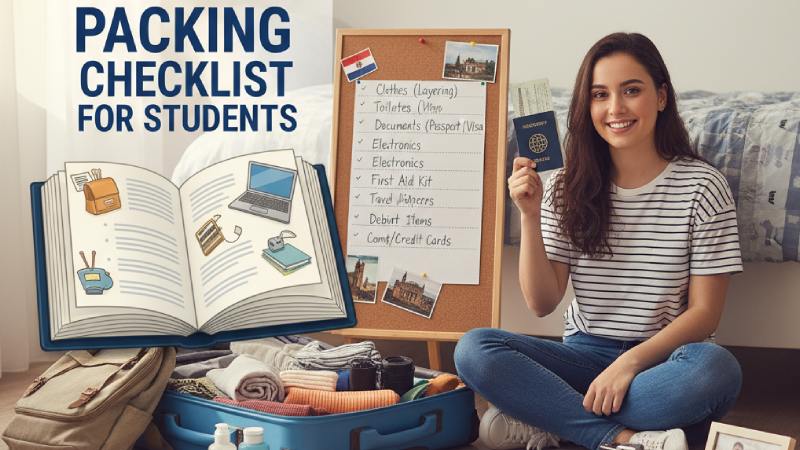Packing for your academic journey abroad is more than just folding clothes into a suitcase. It’s about preparing yourself for a life-changing adventure. With this detailed study abroad packing guide, NewStrides helps you simplify the process so you can focus on your future and not on forgotten essentials.
Essential Items to Pack for Studying Abroad
Passport and Visa (including photocopies)
Your passport is your lifeline overseas. Before departure, ensure it’s valid for at least six months beyond your intended stay. Along with your passport, carry a printed and digital copy of your student visa. Keep a photocopy of both documents separate from the originals in case of theft or loss. It’s wise to upload soft copies to cloud storage and leave a set with family or a trusted friend back home. This small effort could save a lot of stress if you ever need to replace your documents while abroad. Whether you’re planning to study in UK for Indian students or explore options to study in Ireland for Indian students, visa and ID preparedness is essential.
Essential Documents
Your study abroad checklist must include additional documents for smooth travel and university onboarding. Carry printed copies of your university acceptance letter, housing agreement, vaccination certificates, medical insurance details, academic transcripts, and proof of funds (such as bank statements or scholarship awards). Don’t forget your travel itinerary, emergency contact list, and insurance policy numbers. These documents should be organised in a waterproof folder inside your carry-on bag for quick access, especially during immigration or university registration.
Essential First Aid Kit and Medication Prescriptions
Having a personal first aid kit is non-negotiable. Pack essentials such as adhesive bandages, antiseptic wipes, tweezers, pain relievers, allergy medications, and cold/flu tablets. If you have specific medical needs, bring enough prescription medication to last your semester abroad; some medicines might not be readily available or require new prescriptions locally. Always carry a doctor’s note and prescription to avoid customs issues. Don’t forget to include a copy of your medical insurance and emergency medical contact details in your kit.
Local Currency
While cards are widely accepted, it’s smart to keep some local currency when you arrive, for taxis, food stalls, or places that don’t accept cards. Exchange currency at a trusted bank or at the airport before departure. It’s also advisable to carry a small currency pouch with coins and notes for convenience during initial travel days. Always keep some emergency cash separately hidden in your luggage.
Must-have Toiletries
Toiletries are travel essentials, especially during long-haul journeys. Your study abroad packing checklist should include shampoo, conditioner, toothpaste, toothbrush, deodorant, menstrual products (for women), and contact lens solution if needed. Some personal care products may be difficult or expensive to find in certain countries. If you prefer specific brands or eco-friendly options, carry them with you. Use travel-sized, refillable containers to save space and prevent leakage.
Adapters and Converters for Power
Electric plugs and voltages vary across countries. Add universal adapters and voltage converters to your packing list for students going abroad. This ensures your phone, laptop, and other electronics charge safely. Check if your destination requires Type G, Type F, or other plug types. Also, consider carrying a small power bank and USB multi-port charger to keep multiple devices powered at once, very handy during layovers or dorm blackouts.
Essential School Materials
Although you’ll buy some stationery locally, your international student packing list should still include basics like pens, a notebook, a USB drive, and a calculator (if your course demands one). Carry a sturdy backpack or messenger bag that can double as a daypack for short trips or campus commuting. A laptop or tablet is a must for classes, note-taking, and assignments. Be sure to pack chargers and a lightweight laptop sleeve or case.
Other Essential Requirements for Studying Abroad
Beyond the obvious, there are a few extra items that make your transition smoother. A small padlock for lockers, a reusable water bottle, and a microfiber towel can be unexpectedly useful. A daypack is essential for weekend trips, and a compact umbrella can be a lifesaver in unpredictable weather. Don’t forget your glasses or contact lenses, as replacements might be costly abroad. Personal items like family photos or a journal can help ease homesickness. Compact games, books, or an e-reader are great companions during downtime. Remember to keep a list of emergency numbers, including your country’s embassy or consulate.
Things to Avoid Packing for Studying Abroad
It’s easy to overpack, especially when trying to fit your entire life into a suitcase. But your semester abroad packing list should exclude a few items to keep your luggage manageable.
- An excessive amount of food or snacks: While bringing a few favourite snacks is fine, don’t go overboard. You’ll discover plenty of new flavours abroad, and excess food will only add unnecessary weight.
- Large quantities of liquids: Heavy shampoo bottles, lotions, and body wash should be transferred into leak-proof, travel-sized containers. Most of these can be restocked at your destination.
- Multiple books: Physical books add bulk. Pack one or two for leisure and rely on e-books, audiobooks, or your university library for the rest.
- Numerous electronics or appliances: Stick to essentials like your phone, laptop, and headphones. Large appliances like hair dryers or rice cookers can be bought or rented locally.
- Bedding items: Sheets, pillows, and blankets are bulky. Purchase them upon arrival or ask your accommodation provider in advance if they are already provided.
- High-value or luxury goods: Leave expensive jewellery, designer bags, or flashy gadgets at home. They make you a target for theft and add unnecessary risk.
- Items considered culturally inappropriate: Always research your host country’s cultural norms. Avoid packing offensive or inappropriate clothing, like revealing outfits in conservative regions, or items that could unintentionally disrespect local traditions.
Pack Smart, Pack Light!
Studying abroad is about embracing new experiences, not dragging your entire bedroom across the world. Use this study abroad packing list to focus on what matters, and leave space for the memories and souvenirs you’ll collect along the way. Try test-packing in advance and be selective with your choices, your back (and baggage limit) will thank you!
Your Journey Begins with NewStrides
As you prepare for your academic adventure, NewStrides is here to guide you every step of the way. From choosing your ideal destination to offering expert advice on packing smart, we’re committed to helping Indian students thrive internationally. Whether you’re planning to study in the UK for Indian students or explore opportunities to study in Ireland for Indian students, having the right support makes all the difference. Begin your study abroad journey with confidence and a well-packed suitcase!

Priya Kaur is an Assistant Vice President at NewStrides Consulting Pvt. Ltd. With over 18 years of experience in overseas education, she specializes in counseling students for UK and Ireland education. She has visited universities and explored these countries to provide prospective students with insightful guidance and accurate information to make informed decisions for their educational journeys. Her career reflects a commitment to excellence in consulting.


